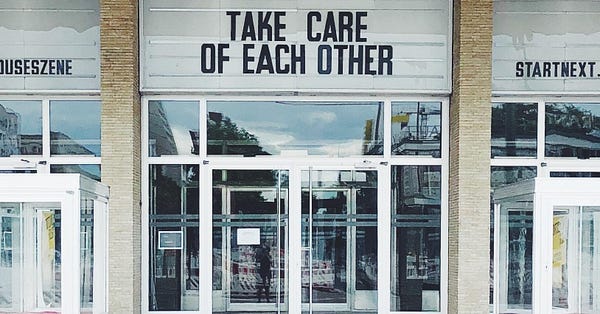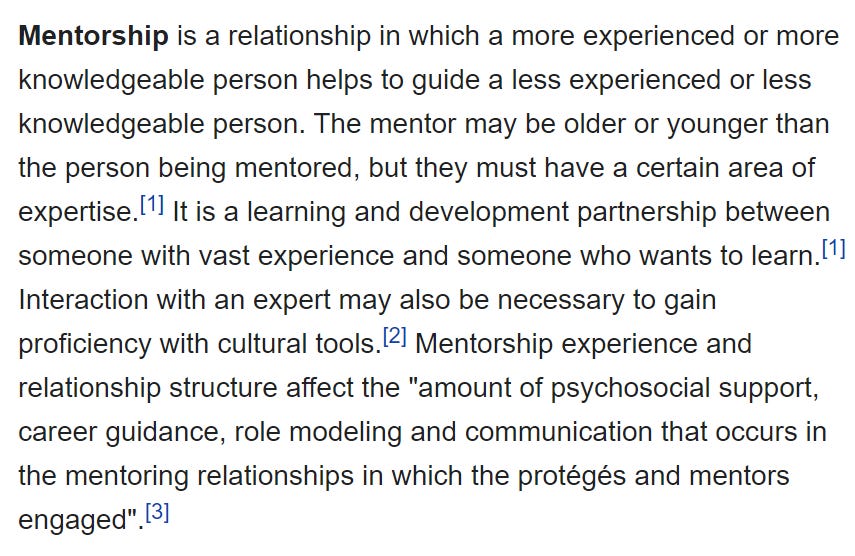Why Mentorship Is a Good Idea
What exactly do people get out of mentor-mentee programs?
In the economic uncertainty of the pandemic, one successful strategy is to adapt and gain new career skills. Mentorship is a good way to do this, whether you’re trying to change jobs or just trying to advance in your current field.
Mentorship is amazing. I have learned so much from my mentors … and I have been super inspired by my mentees. Read on to learn about what mentorship is (and what it isn’t), and how to mentor someone or find a mentor.
What is mentorship?
Here’s what Wikipedia says about mentorship:
January is National Mentoring Month!
The good news is that the COVID-19 pandemic has been a great time for learning new things. I’ve changed my smartphone battery myself, perfected how to make my morning coffee without going to a coffee shop, and have lectured to students living halfway across the country from me via Zoom. Frustrated with the level of COVID-19 misinformation, I’ve also channeled my writing more into science journalism.
As someone with no journalism experience, getting into the industry has been difficult — yet, as I have learned, not impossible. Recently, I learned about the website www.journalismmentors.com. So, I signed up there to speak with a “real” journalist about what it’s like to pitch stories, face rejection, and so on. It was amazing to learn from someone experienced in journalism, who was once facing the challenges I am now.
The truth is that I’ve been a mentor to tons of people throughout my life. In college, I helped middle school students with their science projects. As a graduate student in DC, I organized career panels for people interested in alternative careers in science, beyond being a professor. And now, I enjoy mentoring science writers and helping them succeed. In fact, I’m currently writing a book on how to get started in freelance science writing (stay tuned for that).
Why serve as a mentor?
“I’m a super successful writer,” you might tell yourself. “I’m far beyond the days of working for peanuts, and now clients flock to me. I refuse to tell others about what worked for me, so I can stay the most successful freelance writer I know.”
This a wrong strategy because mentoring helps you learn and grow just as much as it helps others. Here are a few reasons to mentor others.
People can benefit from your expert advice.
With the current unemployment rate, there are lots of people who are trying to break into new careers, and are confused about where they should start. By mentoring, you can help them out! Chatting with someone to share advice on a 15-minute Zoom call can provide useful career advice.
Mentees are inspiring.
Remember when you were just starting out at your current job, and everything seemed really weird and scary? Aren’t you glad you’re not at that point in your career anymore? These days, I face different challenges in my work than figuring out the basics of pitching. Taking people under your wing and helping them do difficult things can inspire you to do the scary things you’ve been putting off for a while, too.
Mentoring is a super smart form of networking.
If you’re an effective mentor, chances are that you’ll have a very successful mentee on your hands — and, thanks to your tutelage, one who can connect you with future opportunities.
Mentoring helps you pay it forward.
Let’s face it, in these unprecedented times, we find ourselves unable to give back to society in the ways we normally might. Mentoring is one way to help others that doesn’t take any real financial investment from you — it just requires a bit of your time.
Mentorship is especially important for marginalized groups (though anyone can benefit from mentoring).
As a woman in science, I often mentored other women who faced barriers in our field and were seeking some guidance. I also benefited from mentorship which helped me understand how to surmount challenges created by sexism. If you can mentor someone who faces similar challenges as you, this can help you understand their career obstacles and how to succeed despite them.
So, how do I become a mentor?
There are tons of ways to get involved in mentoring. One easy way is to create a Calendly meeting scheduling website with blocks of time that you are available to answer questions about your job and what you do. Once you create a Calendly, you can share it on social media and ask for people to sign up.
You can also volunteer as part of a mentoring organization in your field. As a member of the Society for Neuroscience, I mentored students as part of their Women in Neuroscience program.
What does it mean to be a mentor?
Being a mentor is really easy. It involves meeting your mentee where they are and taking an inventory of their skills and career goals, and helping them get where they want to go. This means sharing both successes and failures — mentees can learn from what you did right and what you wish you had done better.
In my recent calls with the mentors listed at www.journalismmentors.com, I simply asked my most burning questions about journalism and my mentor offered some seasoned advice. It’s pretty simple to be a mentor. The best part was when, after my conversation with my mentor, they offered to continue to be a resource for my fledgling science journalism efforts. The networking aspect of mentorship helps a lot! You never know when you might need to reach out to someone for advice in the future.
I’m trying to move forward in my career or change industries. How do I ask others to be a mentor?
It can be awkward to contact people and ask, “Will you be my mentor?” Instead, consider setting up informational interviews with mentors. Ask your network of contacts if they know anyone doing the type of work you are seeking. When I was trying to break into the Capitol Hill world, I looked up random Congressional staffers on LinkedIn and asked them for informational interviews. I would send them a short, professional message asking them if they had 10-15 minutes to spare to talk to me (via phone, though now, in our remote world, Google Hangouts or Zoom works too). After our conversation, they would often refer me to others doing the type of work I was interested in, so I reached out to those people, too. I’ve lost count of how many different Congressional staffers I talked to, trying to figure out if I had what it takes to get a job there — and how to beef up my skills if they were sub-par. Now as a freelance science writer, I regularly hold Google Hangouts meetups with other writers to share advice, chat about the challenges of writing, network, and make new friends!
While you can pay for mentorship, there are plenty of free opportunities out there. Finding a mentor can be as easy as finding a like-minded writer on Twitter and reaching out to them via DM. If you’re a science writer, consider signing up for Joe’s Big Idea, where you can connect with tons of other science writers. You might also consider browsing the science writers database at National Association of Science Writers to reach out to people who might be willing to mentor you.
What mentoring isn’t
Mentoring isn’t about creating a clone or protégé of yourself. As Marina writes in Bolded Science, “A successful mentorship doesn’t result in training the next you; from a successful mentorship emerges two people who feel they have grown and developed from the experience.”
Thanks to Kiara Bellido for sending this article my way, as well as telling me about The Science of Mentorship Podcast, a new podcast from the National Academies of Sciences, Engineering, and Medicine. As Kiara recently mentioned on Twitter, she’s never been able to get into the whole mentoring thing:



One way to reduce the problem Kiara talks about is to think of mentoring as a way to help people get where they want to go, focusing on needed skills and experience. One drawback of most science mentoring programs, for example, is that they don’t cater to jobs outside of academia, because the mentors aren’t familiar with these “alt-ac” jobs. Focusing on basic concepts such as networking and time management is a good way to help mentees, because these aspects are universal to pretty much all career paths. It’s also a good idea to ask mentees about what they are grappling with in their career choices and desired areas of improvement.
Complaining about your job isn’t mentoring
Unless you are trying to be honest and talk about the challenges of your work, complaining about your career does not count as mentorship. In fact, it can be very off-putting to people who are trying to emulate you. I once attended an event in which the presenter, a scientist, complained about his job and encouraged students not to follow his path. He won a major award in his field a few months later. I’m still not sure why he dissuaded us from his career path when he was very clearly a top performer in the field himself. I am assuming he was having a bad day, or perhaps felt threatened by all of the bright-eyed scientists in the audience. Whatever the case may have been, I wish he had been more specific about the challenges he had faced, instead of basically telling us that he found his career path too difficult.
Good mentoring helps people reach their goals
Finally, just because your mentee doesn’t choose the same career path as you doesn’t mean you weren’t a good mentor. Mentees often participate in mentorship programs to learn about different careers and make more informed career decisions.
What are your thoughts on mentoring? What makes a good mentor? What have you learned from your mentors? Leave a comment below or tweet @FancyComma to be featured in the next newsletter!
Links from around The Web
Here’s what I’ve been reading, writing, and watching lately:
I’ve written a couple of stories of science and humanity for The Xylom. Check out my article about my science writing endeavors and my piece on homelessness in COVID-19.
The Colorful Sisters hiked through the desert in sparkly ballgowns, which recently satisfied both my wanderlust and fashion cravings.
Curious what squirrels can teach you about freelancing? Here’s my blog post on the topic.
Check out I recently discovered Danny Margulies’ Freelance to Win website, which has tons of helpful advice for freelance writers working on Upwork. I revamped my Upwork profile thanks to his advice and immediately got three new job invitations overnight!
Apparently, journalists are writing Substack newsletters instead of trying to go viral on social media.
Finally, happy new year! we recapped our year in a series of tweets, which you can find here. A couple of highlights include:




Quote of the Month:
“There is no greater agony than bearing an untold story inside you.” ~ Maya Angelou." - Maya Angelou
Thanks for reading the Fancy Comma, LLC newsletter! Feel free to leave a comment and suggest future newsletter topics, tell us what you’ve been reading, or let us know what you’ve been thinking about lately:
Find us on the web at www.fancycomma.com or on Twitter @FancyComma.

